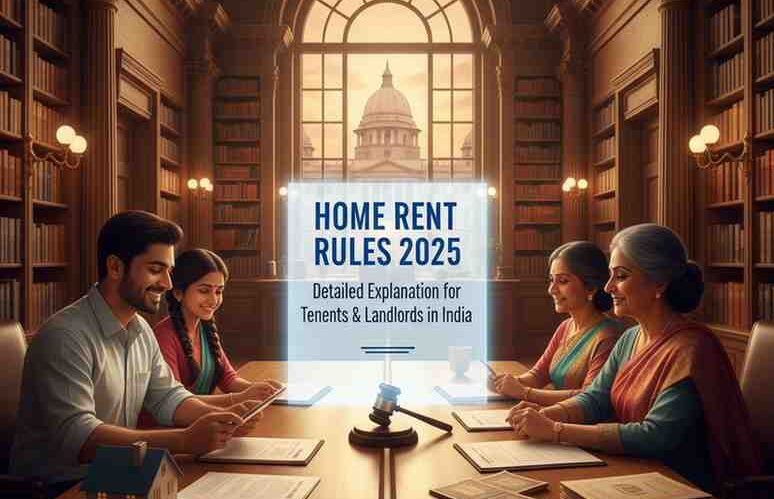The Home Rent Rules 2025 are a major reform in India’s rental housing system. They have been introduced to solve long-standing problems in renting, such as high security deposits, unclear agreements, unpredictable rent hikes, and sudden evictions. These rules bring uniformity, fairness, and legal clarity to tenancy across states.
Below is a fully detailed, step-by-step explanation of what has changed and how it impacts your rental experience.
Why Were the Home Rent Rules 2025 Introduced?
For years, India’s rental market operated without consistent rules. Every city and landlord followed different practices. Some charged huge deposits, some raised rent randomly, and many used vague agreements that did not protect either party.
Common problems included:
- Deposits of 10–12 months in metro cities
- Unwritten or poorly written rental agreements
- Sudden rent increases
- Landlords entering the property without notice
- Tenants refusing to vacate despite agreements
- Endless court cases because of unclear contracts
The government created the Home Rent Rules 2025 to make renting:
- Transparent
- Legally enforceable
- Less stressful
- Predictable
- Tenant- and landlord-friendly
These rules especially target fast-growing metro areas like Delhi, Mumbai, Bengaluru, Chennai, Pune, and Hyderabad, where most rental disputes occur.
Major Features of the Home Rent Rules 2025 (Explained in Detail)
Below is a deep breakdown of each rule:
Security Deposit Cap
Old practice:
Landlords often ask for 6–12 months of rent as a deposit. This was a huge burden for tenants, especially working professionals and students.
New Rule:
- Maximum deposit → 2 months (metros)
- Maximum deposit → 3 months (non-metros)
Why this change?
- To reduce upfront financial stress
- To bring fairness and uniformity
- To prevent landlords from demanding excessive deposits
Result:
Tenants save money, and landlords still get enough security to cover damages.
Standardized Government Rental Agreement
One of the biggest sources of disputes has been poorly written or verbal agreements.
New Rule:
A government-prescribed, standard rental agreement must be used.
This agreement includes:
- Rent amount
- Deposit amount
- Maintenance responsibilities
- Rent hike percentage
- Eviction terms
- Notice period
- Duration of the lease
- Rights and duties of both parties
Why this change?
- Standard agreements leave no room for confusion
- Both parties are legally protected
- Easier enforcement in case of disputes
Result:
Uniformity and legal clarity across India.
Limit on Rent Increases (Hike Cap)
Old Practice:
Landlords could raise rent anytime and by any amount.
New Rule:
- Rent can be increased only once per year
- Hike must be within 5–7%
- Must be clearly mentioned in the agreement
- Written notice must be given in advance
Why this change?
- To prevent sudden, unreasonable rent hikes
- To allow tenants to plan expenses
- To maintain fairness in long-term rentals
Result:
Predictable and transparent rental costs.
Eviction Notice Period of Minimum 90 Days
Old Practice:
Tenants were often asked to leave on short notice or without proper reason.
New Rule:
- A minimum 90-day notice is compulsory
- Eviction must be based on valid reasons, such as
- Non-payment of rent
- Major property damage
- Illegal activities
- The owner needs the property for personal use
Why this change?
- To protect tenants from sudden displacement
- To ensure evictions follow the due legal process
Result:
Tenants get sufficient time to relocate without stress.
Clear Definition of Maintenance Charges
Maintenance has always been a grey area.
New Rule:
Maintenance responsibilities must be clearly stated in the agreement.
Generally:
- Landlord: major repairs, structural damage, plumbing, electrical issues
- Tenant: daily upkeep, cleanliness, minor wear and tear
Why this change?
- To prevent arguments over who pays for what
- To maintain the property properly
Result:
Better property care and fewer disputes.
Advantages of the 2025 Rent Rules
For Tenants
- Lower deposit means less upfront money
- Predictable rent hikes prevent financial shocks
- Legal protection from unfair evictions
- Clear agreements reduce misunderstandings
- Better transparency in all rental terms
For Landlords
- Standardized agreements protect against tenant misuse
- Clear rules reduce disputes and legal battles
- Easier to enforce contract terms
- More professional, streamlined rental process
For the Housing Market
- Promotes a healthy, stable rental ecosystem
- Encourages more people to rent homes
- Reduces stress and conflict in urban housing
Frequently Asked Questions (FAQs)
Are these rules applicable everywhere in India?
Yes, but states will implement them individually. Most metros are adopting them first.
Can landlords still ask for a 6-month deposit?
No. The new legal cap is 2 months in metros and 3 in non-metros.
Can rent be increased twice in a year?
No. Only one increase per year is allowed.
Can landlords enter rented property anytime?
No. They must give prior notice except in emergencies.
Conclusion
The Home Rent Rules 2025 bring a long-awaited transformation to renting in India. With fair deposits, clear agreements, regulated rent hikes, and proper eviction guidelines, tenants and landlords can now enjoy a smoother, more transparent rental relationship. Whether you’re moving into a new home or renting out your property, understanding these rules ensures peace of mind and legal protection for both sides.

























